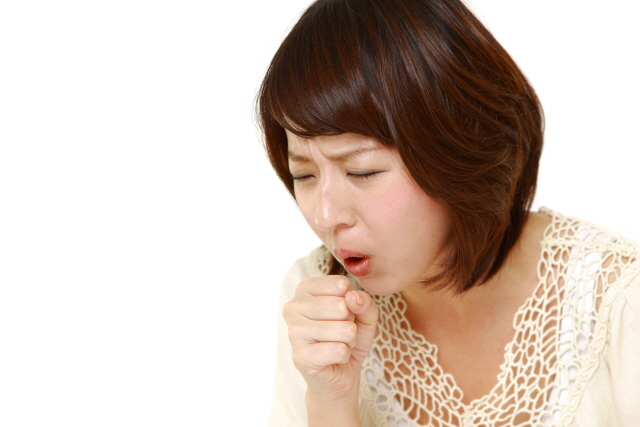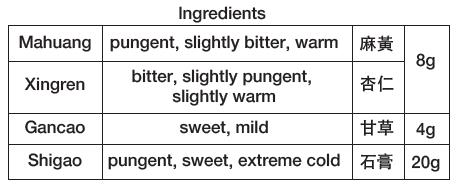
Also Applicable for Asthma, Bronchitis, and Whooping Cough
By Ju Bong Kang, KMD
Acts and Diagnosis
 Superficies syndrome caused by cold damage has been dissolved to some extent, so while there is not much fever, if the sweat persists and the asthmatic cough continues, Maxing-Ganshi-Tang treats it. This prescription is derived from Mahuang-Tang and is made by changing Guizhi from Mahuang-Tang to Shigao. In other words, because symptoms of superficiency, such as headache and joint pain, have disappeared, Guizhi should be removed. Instead, Shigao was added to remove the heat-evil accumulated in the internal organs. In this prescription, Mahuang improves the syndrome of external cold, and Shigao improves the syndrome of internal heat. The symptoms could be treated with Mahuang-Xingren-Gancao-Shigao-Tang, usually shown in people with good digestion.
Superficies syndrome caused by cold damage has been dissolved to some extent, so while there is not much fever, if the sweat persists and the asthmatic cough continues, Maxing-Ganshi-Tang treats it. This prescription is derived from Mahuang-Tang and is made by changing Guizhi from Mahuang-Tang to Shigao. In other words, because symptoms of superficiency, such as headache and joint pain, have disappeared, Guizhi should be removed. Instead, Shigao was added to remove the heat-evil accumulated in the internal organs. In this prescription, Mahuang improves the syndrome of external cold, and Shigao improves the syndrome of internal heat. The symptoms could be treated with Mahuang-Xingren-Gancao-Shigao-Tang, usually shown in people with good digestion.
Although superficies-syndrome has been dissolved to some extent, the pathogenic evils of wind-cold remaining in the lung and bronchia have not yet been entirely removed. In addition, this patient, who usually has good digestion and a developed stomach, has more qi and blood concentrated in the stomach while resisting the exogenous wind-cold. Therefore, the heat from the stomach acts as a heat evil on the lungs and bronchi, so there will be more pressure, the sweat does not stop, and the asthmatic cough continues.
From a pharmacological point of view, the warm property of Mahuang expands the narrowed bronchial tubes with an ephedrine component to drain the remaining wind and cold evil in the lungs and bronchi. The cold property’s Shigao clears the heat evil in the lungs, bronchi, and stomach. So, both pathogenic evils can be removed from the superficies and interior organs.
Among the constituent drugs, Mahuang becomes a monarch drug. This has the functions of promoting sweating, relieving asthma, inducing diuresis, and treating symptoms of cough, asthmatic cough, aversion to cold, and absence of sweating. As for the sweating symptom of this prescription, a different diaphoretic was already applied, so the external cold syndrome has almost been resolved. Still, the heat syndrome of the internal organ remains together with the cold syndrome, so the sweating continues, not due to a deficiency syndrome. So, when aided by the clearing heat effect of Shigao, Mahuang dissipates the wind-cold remaining in the lung and restores the sweating and asthmatic cough.
Shigao becomes a minister drug. It enters the lung and stomach channels, compressing the stomach’s heat, which causes the lung to cough since Shigao removes stomach heat and relieves sweating, thirst, and throat pain.
Xingren works as an adjuvant drug. It eliminates phlegm, stops cough, and alleviates dyspnea, improving cough and asthma caused by wind-cold and stagnated phlegm. This drug is the seed with a descending property that drops evil-qi reversely rising in the chest. In addition, because it is rich in fat oil, it prevents the lungs from drying when Mahuang consumes body fluid.
Gancao becomes an adjuvant drug with Xingren. Not only does Gancao benefit qi, but it also mediates the function of other medications as a sweet flavor and alleviates Mahuang and Shigao with a somewhat strong character. So, this plays the role of guiding drugs as well.
In diagnosis, Maxing-Ganshi-Tang patients cough frequently throughout the day and often do not heal well over a long period. They sweat occasionally but don’t have much heat in the body, and sometimes get a mixture of clear and yellow runny nose. No characteristics appear in abdominal diagnosis, and the pulse is often floating and fast.
Contents in the Source Text
After using the method of sweating, Guizhi-Tang cannot be used again. If the patient sweats, has an asthmatic cough and does not have a severe fever, Mahuang-Xingren-Gancao-Shigao-Tang can be given. -『Shang Han Lun』
Application
They are used for cough, asthma, bronchitis, pneumonia, and whooping cough, which are sweaty and thirsty.
Distinction
Maimendong-Tang: This prescription is for thick sputum, cough, and asthma. Coughing tends to be red, and it is worse at night. There are a few symptoms of night cough in Maxing-Ganshi-Tang at night.
Xiao-Qinglong-Tang: In this prescription, there is a fever, cough, watery sputum and runny nose, but no sweat. On the other hand, Maxing-Ganshi-Tang has a cough and sweat, no fever, and does not have much runny nose or a mixture of clear runny nose and yellowish one. Clear runny nose comes from superficies-cold, and the yellow runny nose comes from stomach-heat.
Suzi-Jiangqi-Tang: Cough patients in Maxing-Ganshi-Tang have symptoms of sweat and thirst, and cough patients in Suzhi-Jiangqi-Tang have no symptoms of sweat or thirst. The former patients usually have good and excellent digestion, while the latter have moderate or weak digestion.
































